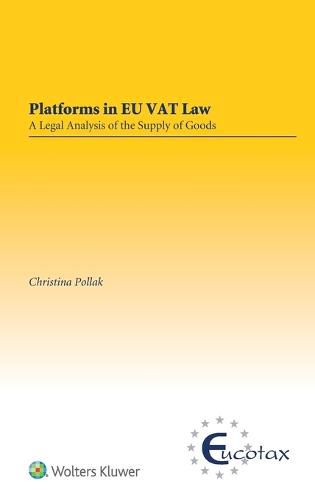Readings Newsletter
Become a Readings Member to make your shopping experience even easier.
Sign in or sign up for free!
You’re not far away from qualifying for FREE standard shipping within Australia
You’ve qualified for FREE standard shipping within Australia
The cart is loading…






Applying the provisions of the European Union Value Added Tax (EU VAT) Directive poses challenges when applied to the digital platform economy. Recent responses to these challenges revolve around the deemed supplier regime introduced by the so-called e-commerce package, and this regime is thus the focus of this indispensable work, the first to provide an in-depth analysis of the regime, its background and scope, its interpretation, and its application in practice.
In its detailed examination of how digital platforms that enable supplies of goods through their interfaces are treated for VAT purposes under EU law, the author elucidates such topics and issues as the following:
The qualification of the sale of goods through platforms;
supply of the platform service to the underlying supplier;
supply of the platform service to the customer;
supply of goods from the underlying supplier to the customer;
supplies from third countries;
the Organisation for Economic Co-operation and Development (OECD) proposal's influence on the interpretation of the EU e-commerce package;
chain transactions;
determination of the place of supply;
chargeable event and chargeability of VAT;
taxable amount;
applicable rates and exemptions;
platform's recordkeeping obligations;
accompanying customs measures;
return of goods and warranty cases; and
future of effective and efficient VAT collection.
The author also undertakes a detailed analysis of a potential infringement of the principle of equality, neutrality, and the right to conduct a business.
Fully taking into consideration the case law of the CJEU, administrative practice, and the relevant academic literature, the author's research reveals the weaknesses, opportunities, and limits for Member States' implementation of EU VAT law. The upshot is an important work that promises to make the EU VAT system more fraud-resistant, simplify compliance obligations, enforce the principle of neutrality, and reduce distortion of competition. The book will be of immeasurable value to any practitioner and policymaker approaching any case involving the deemed supplier regime for digital platforms with full awareness of the applicable rules.
$9.00 standard shipping within Australia
FREE standard shipping within Australia for orders over $100.00
Express & International shipping calculated at checkout
Applying the provisions of the European Union Value Added Tax (EU VAT) Directive poses challenges when applied to the digital platform economy. Recent responses to these challenges revolve around the deemed supplier regime introduced by the so-called e-commerce package, and this regime is thus the focus of this indispensable work, the first to provide an in-depth analysis of the regime, its background and scope, its interpretation, and its application in practice.
In its detailed examination of how digital platforms that enable supplies of goods through their interfaces are treated for VAT purposes under EU law, the author elucidates such topics and issues as the following:
The qualification of the sale of goods through platforms;
supply of the platform service to the underlying supplier;
supply of the platform service to the customer;
supply of goods from the underlying supplier to the customer;
supplies from third countries;
the Organisation for Economic Co-operation and Development (OECD) proposal's influence on the interpretation of the EU e-commerce package;
chain transactions;
determination of the place of supply;
chargeable event and chargeability of VAT;
taxable amount;
applicable rates and exemptions;
platform's recordkeeping obligations;
accompanying customs measures;
return of goods and warranty cases; and
future of effective and efficient VAT collection.
The author also undertakes a detailed analysis of a potential infringement of the principle of equality, neutrality, and the right to conduct a business.
Fully taking into consideration the case law of the CJEU, administrative practice, and the relevant academic literature, the author's research reveals the weaknesses, opportunities, and limits for Member States' implementation of EU VAT law. The upshot is an important work that promises to make the EU VAT system more fraud-resistant, simplify compliance obligations, enforce the principle of neutrality, and reduce distortion of competition. The book will be of immeasurable value to any practitioner and policymaker approaching any case involving the deemed supplier regime for digital platforms with full awareness of the applicable rules.